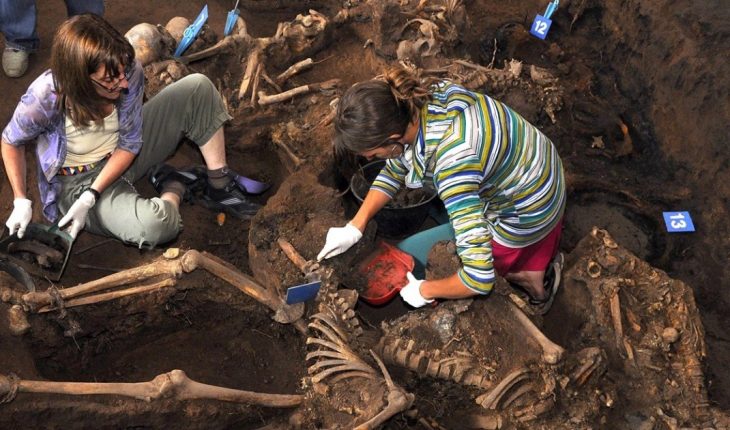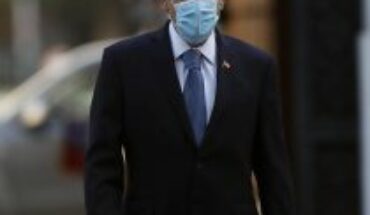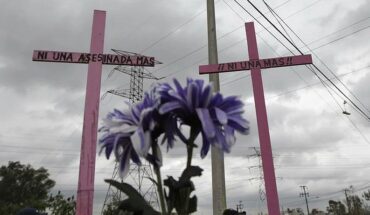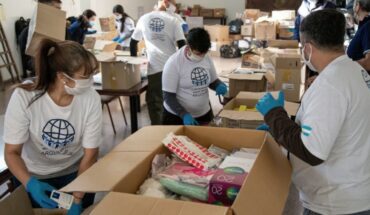“In Argentina, the locas of Plaza de Mayo will be an example of mental health, because they refused to forget in times of obligatory amnesia,” Eduardo Galeano wrote in “Right to Delirium”. Years later, this phrase continues to resonate more than ever in Argentina. Eduardo Galeano was a visionary of the past, present and future, because while today we are a society where we can raise the flag of democracy, today another mother raises her cry of pain. Cristina Castro is another madwoman, in the words of the Uruguayan writer. Another madwoman who refuses to stand by and demands Memory, Truth and Justice.
Argentine Forensic Anthropology Team: a constant search for identity
However, in the face of so much uncertainty and a complex knot of lattice-ups that have institutions, state and society in their eyes, there is a group of professionals who bring their share of truth through their work. Who are you? The Argentine Forensic Anthropology Team (EAAF).
First EAAF training.
Like the Mothers and Grandmothers of Plaza de Mayo, there is an immense wave of people willing not to forget what happened in the country. Students, families, groupings… the world. That’s why in their quest for truth, the Grandmothers of Plaza de Mayo traveled to the United States, where they found the support of the American Association for the Advancement of Science. Clyde Snow, a professor and forensic anthropologist, was part of the American Association, and was the one who trained and founded the Argentine Forensic Anthropology Team, convening students from different disciplines such as Archaeology and Medicine. Among these students was a young Luis Fondebrider, who was in the first year of Antropología.La the implementation and development of Forensic Anthropology, was instrumental in investigating human rights violations, which emerged at a time of intense political violence and repression by Latin American states.” Like many people at the time, he accompanied the human rights movement of the last years of the dictatorship,” Luis Fondebrider told Filo.news, already as leader of EAAF. “When this juncture came, we were still mobilized, but already from the most concrete labor practice.”
Luis Fondebrider. Behind, a Guatemalan gift: “Gratitude to the Argentine Forensic Anthropology Team”.
Doctor of Forensic Anthropology and founder of EAAF, Fondebrider and the Team were responsible, in the heat of the return of democracy, for the exhumation of missing persons bodies during the self-styled National Reorganization Process, and other cases of international relevance such as: Ernesto “Che” Guevara, former Chilean President Salvador Allende, Pablo Neruda, Azuzena Villaflor, Marcelo Gelman. They were also responsible for the exhumation of bodies of eleven Colombian deputies killed at the hands of the FARC, Ayotzinapa students and soldiers of the Falklands War.
The Argentine Forensic Anthropology Team, identifying bodies belonging to the soldiers of the Falklands.
“We started working on cases and getting to know family members. We started a line of work without much planning, that was leading us to get in more and more, to investigate what had happened to the bodies of the missing persons,” explained Fondebrider, who sought, together with the other members, to materialize his knowledge and give them an answer to both relatives of the victims and justice.Beginnings of the Argentine Team of Forensic AnthropologyThe team was formally born in 1986 when the young students obtained a scholarship from an agency which allowed them to quit their jobs and start formally working in an office and devote themselves, fully, to Anthropology. “There were six, seven people and, little by little, we expanded the institution, but in those early years we were very little: reading court records, going to cemeteries, researching and talking to the relatives who asked for our work,” the Doctor said. Thus, they were able to open offices in New York, Mexico and South Africa incorporating almost 70 professionals from even disciplines not surrounding the field of forensic science and criminal science, such as: Physics, Sociology, Architecture and Biology.” What we do a while ago is incorporate non-traditional disciplines into the forensic field to enrich work and have a deeper analysis. It’s a pretty new thing,” said the team leader.
The Team todayThe EAAF became an organizeda pioneering scientific ation in the world for working in a multidisciplinary way, covering all the steps of research: from initial contact with families to restitution of the remains, to the work of search, recovery and laboratory analysis. Until 2004, the Team was supported by the contribution of nine US and European Human Rights Foundations. From that year until now, the Argentine state began subsidizing them. However, what comforts them is not that, but their consequence: “Your contributions are what make family members not charge them anything for our work,” Fondebrider confessed, “But there is something, that both Luis and the rest of the Team, although it sounds utopian, would like even more: not to follow exhumane bodies of victims. In a society with memory, no one would have to ask for the appearance of a living person. However, the Never Again Is On the Move, it increasingly loses its strength. In democracy, disappearances at the hands of state forces continued: Miguel Bru, Luciano Arruga, Facundo Astudillo Castro, to name just a few.
Never again. Photo: Natacha Pisarenko.
“Democracy doesn’t solve violence, but it’s a way to handle conflict better,” Luis said. “Obviously, we would prefer that they have not died and disappeared in democracy, but it is a circumstance that occurs and that is a construction of the whole society. It’s not just up to the state, but we all have to be involved to make that Never Again concrete and real.” EAAF not only works on human and humanitarian rights violations, but also engages in cases of current disappearances for trafficking-related crimes, migration, institutional violence, drug trafficking and macrocriminality, among other crimes. This is why the world is willing to appreciate the value of its contribution to society. This year, EAAF was nominated for the Nobel Peace Prize, and while it is not indifferent to winning it or not, Fondebrider does not take away his dream: “We appreciate you thinking about us for this, we continue to work as always and obviously if we get to receive the prize, that honor will be shared with many people. The task we carry out would be impossible to do so without the support of Argentine society that from different sectors, mainly from civil society, has fought for equality and justice.” The team before the pandemic by COVID-19Muchas have been the doubts regarding the pandemic, and is that the coronavirus crossed our lives so fast that the schemes had to be molded on the fly. Faced with this situation, Team Argentino also did not want to stop contributing from their side. Disseminated through training, social media and seminars, they developed a protocol to treat the bodies of people who died of coronavirus. “They must be treated with respect and dignity and also their families,” Fondebrider explained, ensuring that the treatment to be applied is the same as that of a person who died of a catastrophe. In addition, the coronavirus put death on the daily agenda. Every day, society is aware of the daily report and the havoc of the pandemic. Without a doubt, something the Team deals with every day: death.
“We always say we’re more in touch with life than with death,” Fondebrider re-populated. “Behind every death are hundreds of relatives who want to know more, who want to investigate. Contact with family members is what gives us strength, and in difficult times it gives us the energy to keep working.” The media in eaAF cases”Overall, the coverage I see in the media seems very poor, very uns professional and very sensational,” said Luis Fondebrider. These words were released by the anthropologist on the morning of Monday, August 31, in conversation with Filo.news. That same day, hours later, most of the country’s most important mass media claimed that the body found in Villarino was from Facundo Astudillo Castro. They published the news without official confirmation from the family, nor from their lawyer Leandro Aparicio, nor from Justice, nor from the Argentine Forensic Anthropology Team.Undoubtedly, events like these show the little commitment, professionalism and ethics on the part of journalism. That is why we ask ourselves: what are we willing to negotiate to have the scoop? Given the seriousness and fragility of the case, it is important more than ever to strengthen the media’s commitment to society, leaving sensationalism aside once and for all on sensitive issues. Not only is false information being disseminated in this way, but the pain of the victim’s loved ones is being exposed.” Hasand lack of professionalism: today a journalist talks about economics, sports tomorrow and past shows. They don’t form, they don’t try to understand what they’re talking about. Of course there are exceptions, but those exceptions are not generally in the media we see every day. That really does a lot of wrong for family members, as they watch on TV and listen on the radio barbarities that, in fact, what they do is generate more anguish and more pain.”
The system is so mediocre in the country, there are confusions and misinterpretations. Media times are not the times to discuss something seriously, in two, three, four minutes, nothing is discussed.
Why do you think state violence is perpetuated even with the horrible past we have and the great wound left after the dictatorship?
State violence occurs in both democracy and dictatorship. In the case of dictatorships, a person’s disappearance is for political, ethnic or religious reasons. In democracy, they are often caused by institutional violence, femicides, migration or drug trafficking. The origins of violence are multiple and each state handles them as it can. When states investigated their cases of crimes against humanity in dictatorships, several of their perpetrators enjoyed impunity (not in the case of Argentina). For this reason, there is a stronger tendency to reproduction of violence. Justice has a very distant role from what has happened: people who committed crimes in the past went unpunished, free, and somehow this kind of violence is repeated today.





